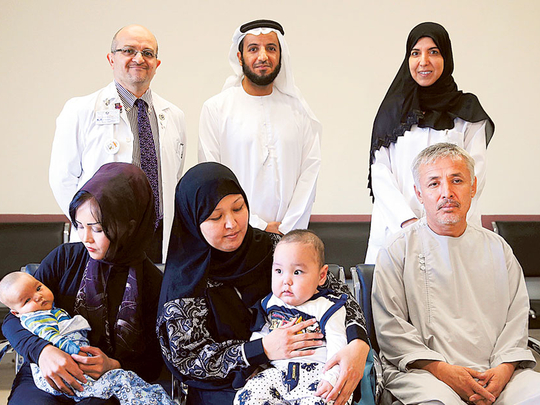
Sharjah: A four-month-old baby boy born with a rare disease underwent a successful, complex operation at Al Qasimi Hospital yesterday.
The little boy, identified as Mohammad, of Afghan nationality, was born with congenital hyperinsulinism [excessive production of insulin by the pancreas].
“Congenital defects causing hyperinsulinism require surgery and are commonly successful without complications,” said Dr Khalid Khalfan Bin Sabt, paediatric surgery consultant and deputy technical director of the hospital. ”If the baby had not undergone the surgery, brain damage would have occurred.”
Within three hours of the baby having been diagnosed with the condition, Dr Bin Sabt and Dr Mohammad Hassan, consultant, paediatric surgery, decided to go ahead with the thoracoscopic surgery.
In the first-of-its kind surgery in the UAE and GCC, the surgeons were able to conduct the complex and rare operation of removing 90 per cent of the baby’s pancreas by making very small holes in the baby’s abdomen and using tiny laparoscopic instruments through them, a technique that had a positive outcome for the baby’s fast recovery.
Only 10 per cent of Mohammad’s pancreas remain in his body.
After the surgery, the baby spent four days in recovery in the neonatal intensive care unit before being discharged. He is now at home with his parents and has made a full recovery.
Dr Bin Sabt said: “We are happy that the surgery has led to great results and the baby has recovered well without any complications.”
Five years back, Mohammad’s sister, Sadaf, had also suffered from the same condition and was operated for it.
Dr Bin Sabt told Gulf News that congenital hyperinsulinism is the most frequent cause of severe, persistent hypoglycaemia in newborns and children. In most countries, it occurs in approximately 1 to 50,000 births. About 60 per cent of babies with hyperinsulinism develop hypoglycaemia during the first month of life. An additional 30 per cent will be diagnosed later in the first year and the remainder after that.
With early treatment and aggressive prevention of hypoglycaemia, brain damage can be prevented. However, brain damage can occur in up to 50 per cent of children with hyperinsulinism if their condition is not diagnosed or if treatment is ineffective.
Dr Bin Sabt praised the efforts of the surgery team including Dr Mohammad Hassan, Dr Elham Al Ameir, Dr Muna Khalaf and Dr Liyla Tryam. He also hailed the support of anaesthesiologists and doctors in the newborn intensive care unit, which made it possible for the operation to be such a success.
He said that these efforts are the first steps in establishing a specialised centre in paediatric minimally invasive surgery for children in the Middle East. This will start soon, with the opening of the Ministry of Health’s new facility in Sharjah for women and newborns. The facility will include two operating rooms equipped with the latest technology in the field of paediatric surgery












